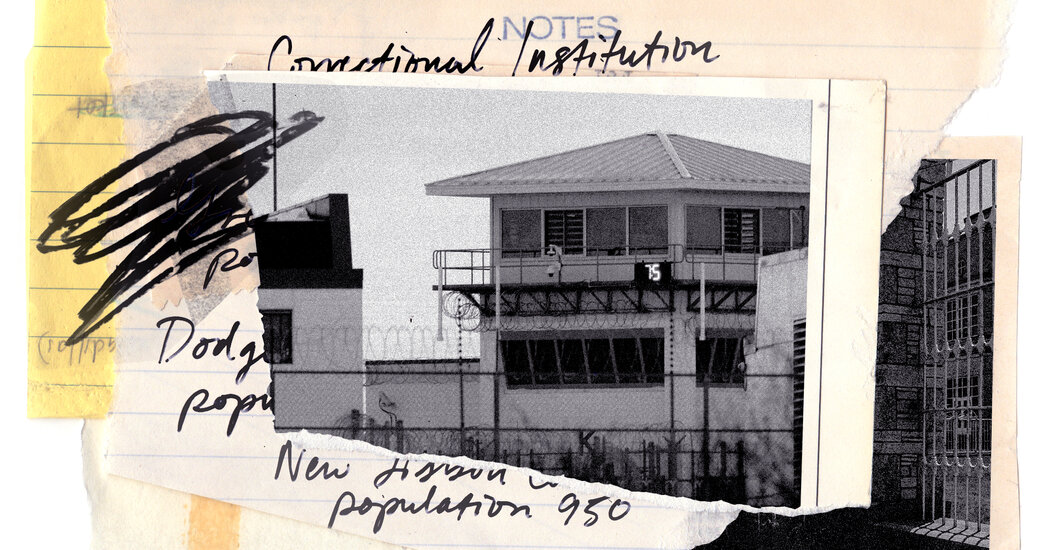Times Insider explains who we are and what we do, and delivers behind-the-scenes insights into how our journalism comes together.
I never expected to become a real reporter. While the other students in my first journalism class could go out into the community to interview sources, my options were limited. As an inmate, the only people I could interview were other prisoners and the guards.
It was 2010, and I was a 28-year-old alcoholic with a crack habit serving a yearlong sentence in a Wisconsin county jail. I’d been convicted of burglary after breaking into a bar and walking out with a bottle of liquor. It was a felony, and it was right on time — the culmination of wrecked cars, lost jobs and alcohol-fueled arrests. When the judge sentenced me, he said I exemplified “a waste of a human life.” He wasn’t wrong.
During those first months behind bars, there was no sun, no night sky. I measured time by the opening and closing of the steel cell doors. But midway through my sentence, as is typical in many cases, the judge granted me the option to work or take classes during the day at a nearby university.
I took a janitorial job in the community, elated to be out of my cell. One morning as I vacuumed, I grabbed a Rolling Stone magazine from a coffee table. Out slipped a flier for a college journalism contest; winning entries would appear in the magazine. Only college students could enter.
I didn’t know anything about journalism, but I felt an odd sensation — an intuition — that I’d finally found something I didn’t even know I needed. That day, I enrolled in the university closest to the jail.
That’s how I found myself, weeks later, interviewing my correctional officer for a story in the student newspaper. We had never spoken with each other so mindfully or exactingly. This was someone who, at any other time, had absolute authority over me. Yet in that moment, while interviewing him, I felt a subtle and palpable shift of power.
I could sense him calculating what he wanted to say, leaving out words that might get him in trouble. I felt empowered to chase after those pregnant pauses, to seek out the truth and bring order to the world around me. The experience was liberating. It showed that even an inmate’s voice could resonate if facts and rigorous research backed up what he or she had to say.
After my release, I stayed in school, eventually earning a master’s degree in journalism. And I kept writing. Story by story, and with the help of patient editors, I learned how to report and write better, faster. I got sober. Finally, I landed a reporting internship, then a full-time job.
In the years since, I have been a reporter in California and returned home to take a reporting job with Wisconsin Watch — the place that offered me my first internship.
And then, last June, 13 years after I wrote my first article from a Wisconsin jail, I began covering the state’s prison system as a New York Times Local Investigations fellow. The fellowship program is designed to strengthen the power and reach of local journalism.
By then, I had a mounting stack of letters from men housed at Waupun Correctional Institution who had been confined to their cells for months without regular access to showers, fresh air, family visits and timely medical care. In August, guided by a team of editors that included Dean Baquet, a former executive editor of The Times, I broke the story that the state was locking down prisons because of staffing shortages.
In February, we revealed that the state knew for years it was losing guards faster than it could replace them. Then in June, I reported on the extraordinary arrests of nine prison employees, including a former warden, in connection with a string of inmate deaths.
Our latest article brought to light another fact: Nearly a third of the 60 staff physicians the corrections system has employed over the last decade have been disciplined by a state medical board for an error or a breach of ethics.
My past has put me in a unique position. As a reporter, I purposefully detach myself from my investigations to follow the truth, wherever it leads. I value independence. But, like anyone else, I have been shaped by my experiences. I know the smell of jailhouses and the ever-present hunger pangs prisoners feel. I know what it means to be denied fresh air for months. I’ve also seen the unexpected acts of kindness that happen behind bars.
My experiences inform who I talk to — and who talks to me — and how I approach my reporting. For better or worse, I am forever a member of this community. And that’s the very spirit of local journalism.





